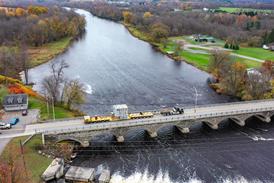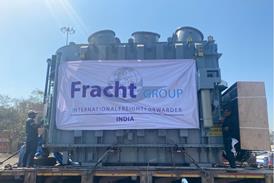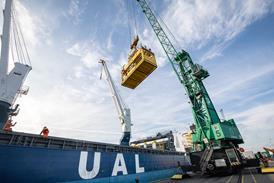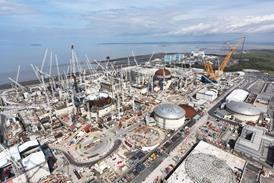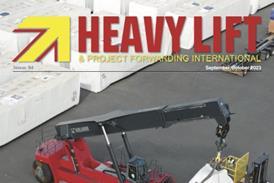May 23 - Global heavy lift and transport company ALE has launched its new Mega Jack system at its R&D facility in Breda, the Netherlands.
ALE says that the system is capable of lifting 50,000 tonnes to a height of 25 m, and has been developed to meet increasing demand in the offshore industry to jack up larger and heavier oil and gas platform modules and other large structures.
The system comprises of jacking towers each with a capacity of 5,200 tonnes and consists of four jacking bases that contain a hydraulic jack with a stroke of 1,250mm. A temporary support is situated on top of each jacking base, which is also a hydraulic turntable.
With the starter beams in position above the jacking bases and the jacks fully retracted, the system is ready to make its first stroke. In this position the starter height is just below 3.5 m. After that two of four integral feed-in systems automatically insert the first set of jacking beams through the temporary supports. Once in place, the jacks extend and raise the beams above the temporary supports, which rotate to hold the load while aligning their open sides with the other two feed-in systems, ready to repeat the process.
The result is a simple, but incredibly powerful five metre by five metre self-erecting tower, which can be built up until it reaches the desired height, claims ALE.
The jacking down process can start after the load-out support frame is put in place and, as the starter beam is not welded to the deck, the tower can be lowered instantly. Stability is achieved by using a very accurate hydraulic stroke controlled system, rather than being fixed to the deck.
Totally scalable, the number of towers can be adapted and increased according to the size, weight and balance of the structure, opening up new possibilities for an offshore sector increasingly under pressure to build ever bigger rigs. Basic tower footprints consists of 2.5 m x 2.5 m, 2.5 m x 5 m and 5 m x 5 m jacking base centre distances, enabling ALE to tailor solutions for each client.
By combining jacking bases in different configurations and jacking points, 5,000, 10,000 and 15,000 tonnes capacities can be created.
Executive director Ronald Hoefmans explains: "The Mega Jack has been built to fill a huge gap in the market. We've consulted clients at every stage of development, which has given us focus to really push the boundaries of engineering and develop a technology that can not only jack up structures of staggering weights and sizes, but can jack them higher and with greater stability and control than previously thought possible.
"Its ability to jack up complete structures also cuts the requirement for multiple load-outs, offering significant time and cost savings for clients as well as minimising the need to work at height."
With safety paramount, a specially designed control room on the Mega Jack automatically monitors activity and collects data. Its computer system can process information such as deck height, ground settlement and weather-related influence on the jack-up operation to create simulations for continuing safe operation.
The testing phase of a single tower this month will be followed by the construction of a four-tower system, due to be ready for commercial use by December 2011 and a 10-tower system in 2012.
The company says that it is continuing to develop the Mega Jack system to handle heavier loads to heights of 50 metres and adapt the technology to suit other applications in other industries.

